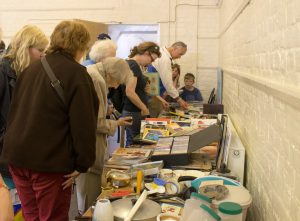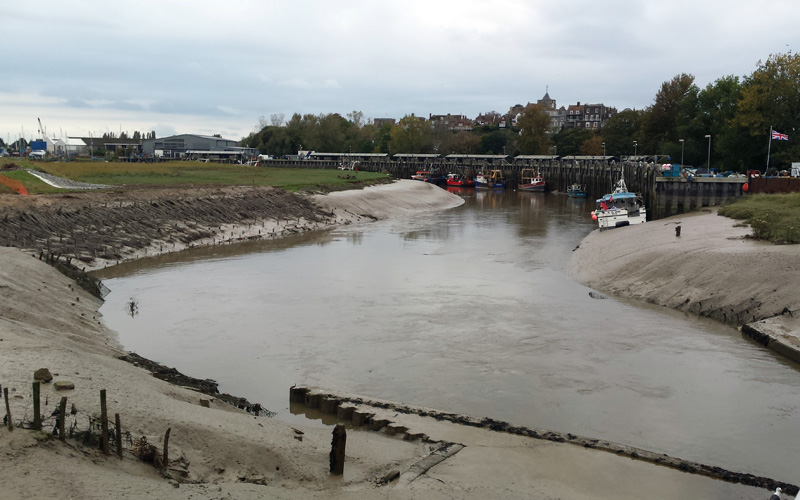In the last of three articles on climate change’s impact on Rye Anthony Kimber writes about what we can do as individuals. His first article looked at what was happening internationally and his second explored what is happening locally.
What else should we or could we do? Here are six widely agreed and recommended measures that as a community we can all focus on.
1. Reduce emissions: Join the move to electric or hybrid vehicles; use vehicles less; instead use sustainable transportation, such as walking, bicycling, or using public transport. When using a vehicle, remember that every time speed is increased, this will increase CO2 emissions and expenses. Each litre of fuel burnt equals 2.3kg of CO2 emissions. For long-distance travel, trains are more sustainable than airplanes, which cause a great deal of the CO2 emissions.
2. Save energy: Take a look at the labels on your appliances and reduce the number left on standby. Always adjust thermostats to govern heating and air conditioning.
3. Put the 3 Rs of sustainability into practice:
- Reduce consumption
- Re-use by taking advantage of second-hand markets, upcycling and recycling.
- Recycle packaging, food into compost, waste from electronics. You can save over 700kg of CO2 each year just by recycling half of the waste produced at home

Rye’s swap shop offers a great opportunity to recycle and reuse
4. Diet: Reduce meat consumption (livestock is one of the biggest contaminators of the atmosphere) and increase your consumption of fruits and vegetables. Eat food that is local and in season: read the label and eat food that is produced in the area, avoid imports which create more emissions because of transportation.
5. Consider forest loss. Buy only wood with a certification or seal showing its sustainable origin. Plant a tree or shrub! Throughout its life, it can absorb up to a tonne of CO2. Rye will have an initiative in 2020 to promote this.
6. Demand that politicians take all measures toward a more sustainable life by promoting renewable energy, setting regulatory measures such as properly labelling products (fishing methods used, labels that specify product origins, whether or not they are transgenic, etc.), encouraging more sustainable public transportation, promoting walking and the use of bicycles and other non-polluting transportation methods; managing waste through recycling/reuse.
After COP 25 (the regular international conference on climate change), it was widely reported that the public had woken up to the climate crisis. What is not clear is whether politicians have done the same, as there has been little concrete progress to show.
Protests in 2019 have sparked a rush by governments to declare a “climate emergency” and to set or retrench future emissions targets. In previous years this alone would have seemed radical enough and generated enormous goodwill. However, the gap between words and actions has widened. Credibility in necessary action is at a low.
Image Credits: Rye News library , Swap Shop .




Climate changes – it always has. There have been five mass extinctions in the world’s history, none of them man made. The storms that have beset us are actually caused by dramatic polar cooling pushing the jet stream south. We really must exercise caution in over dramatising both the problem and human ability to alter nature. Knee jerk reactions are already having a damaging effect on the environment and people’s health. Over-insulation of homes has led to a dramatic rise in black mould and allergies. The constant ‘meat bashing’ has led many to assume that they are not omnivorous, a position that raises many long term health threats.
Certainly, we were all fitter and healthier after WW2 a) because we had a restricted diet and b) because most of us walked miles every day. Obviously there are benefits in that life style and encouraging it. So called sustainable energy is destroying swathes of nature, worse the concrete, steel and glass fibre (themselves major pollutants) prevent nature cleaning itself. No thought seems to have been given to recycling the windmills and solar panels when they reach the end of their short lives. The same is true of electric vehicles that present not just dreadful environmental recycling problems, but threaten to exhaust supplies of scares minerals too. All this may well have the Champagne corks popping in boardrooms across the world, but is it not just storing trouble for the future?
There is an elephant in the room, that no one talks about. Humans. Every person produces between 500 to 1,500 ml of gas a day. There are currently 7.8 billion people. It was 2 billion in 1927. The current thinking is that it will reach close to 11 billion by 2100 and then go into decline – due to human fertility dropping. Quite what science is used to arrive at that conclusion is not clear. Certainly, it is clear that humans are a problem, even if no one wants to talk about it.
There are sustainable energy sources such as wave power, hydro electricity and gas from waste that are, bafflingly, largely ignored. The injunction to use public transport is fine until one realises that the cost is a deterrent for those on low wages.
It is time start thinking as Brunel would have done. Let us be bold and innovative in harnessing our ignored energy sources. Promote Hydrogen vehicles. Above all take a proper look at infrastructure. HS2 is a mess largely because of planning and compensation costs. The solution seems obvious. Motorways are state owned. Overhead railways running down the central reservation would dramatically cut costs. Start a new industry, provide new jobs and dramatically alter our infrastructure for the better. Unless we want to live in caves it’s time to get rid of the old, windmill, mentality.
Apocolypse or panic?
The latter I think. Another ‘expert’ who has sold out to the warming brigade.
As there is no proven causal link between CO2 levels in the atmosphere and warming of the earth’s surface, how can these people predict anything and hence what we can do about it.
Most of what we are being offered will destroy western society and do little to stop climate change.
The clue is in the name: ‘climate and change’, the earths climate has always changed from hot to cold and back again, to a moist water-laden atmosphere to hot arid conditions. When just one large volcanic eruption can throw enough dust into the atmos[here to block out the sun for weeks and enough CO2 and methane to make man’s puny efforts seem like a fly on an elephant’s back, then man has lost all perspective and reason
Climate change part 3
Oh for the days when we had a Siberian anticyclone spreading a cold easterly wind, dry,and sunny winter days towards Britain. a complete opposite is happening now mild wet windy weather cause by the jet stream spreading west to the British isle.climate change maybe but not created by man these jet streams and anticyclone have been around for since records began
But according to some scientists the jet stream belt could get wider, looks like we’re all doomed.
September and February you could rely on having a holiday nice / dry and warm in September cold dry and sunny in February both months had a long anti cyclonic spells lasting sometimes as long as 3 weeks
The only consolation from this milder winter is turning down one’s thermostats at home must be bonus for millions of householders saving all that energy.
Feel really sorrow for these poor home owners being flooded for weeks now must be heartbreaking losing almost everything in the home.
Let’s hope in March / April a very large Siberian anticyclone turns up and turns the weather vanes to a dry and sunny easterly wind direction for several weeks or months.
Vv